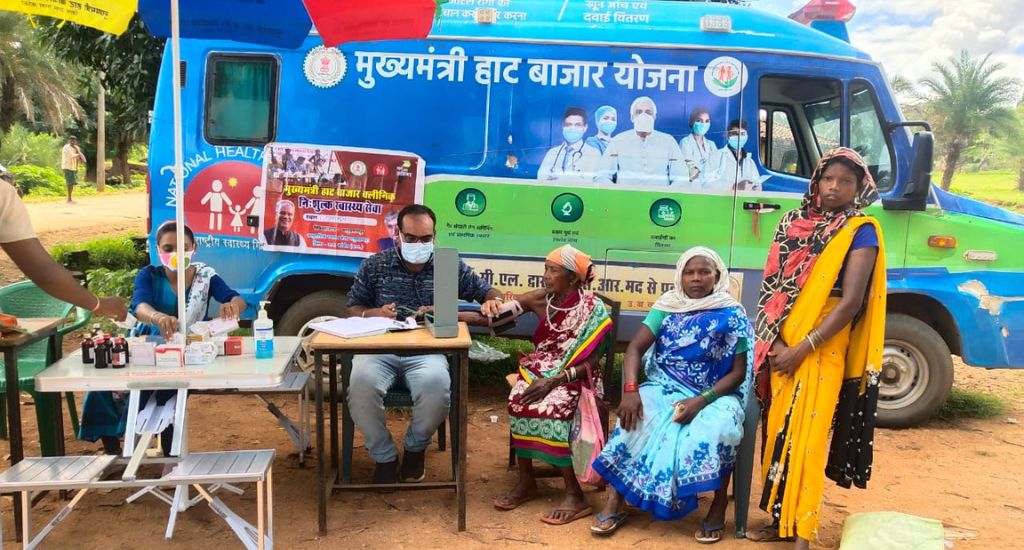
Weekly markets bring healthcare closer to Chhattisgarh tribals
Haat bazaar clinics organised in weekly rural markets prove to be a boon for communities in remote tribal villages that lack healthcare facilities.

Haat bazaar clinics organised in weekly rural markets prove to be a boon for communities in remote tribal villages that lack healthcare facilities.
Kanker district is located in the southern region of Chhattisgarh. Earlier a part of the old Bastar district, Kanker was made a separate district in 1998. With 1,004 villages, this district is predominantly rural. Scheduled Tribes make up 55 percent of the population, with a majority of them living in remote, forested and inaccessible areas.
Existing healthcare infrastructure and facilities do not always reach these places in a timely manner due to remoteness or lack of infrastructure and health personnel. This is further exacerbated by naxalism.
The nearest hospital would be miles away, delaying the identification and treatment of illnesses in rural areas, especially among the tribes. In such a situation, the haat bazaar clinics bring free and comprehensive healthcare facilities to the rural people.
These clinics are conducted during the traditional weekly haats or markets, a popular place for the communities to buy items for their daily needs. The clinics have made basic, free medical healthcare and pathology services accessible to residents of remote villages and forests.
To provide integrated health services at the weekly markets, the haat bazaar clinic scheme was launched on 2 October, 2019 on the occasion of the 150th birth anniversary of Mahatma Gandhi.
Initiated by the state Health and Family Welfare Department, the clinics are set up in the weekly markets where the local people can access healthcare services easily. The follow-up process is also easy as the clinics are set up weekly. The clinics facilitate weekly check-ups and treatment, enabling patients to access basic healthcare services faster.
Also Read | Women of Lalganj mobilize community to bring doctors to their doorsteps

The focus is on preventive healthcare, conducting regular health clinics and awareness programmes for various health issues. This proactive approach helps identify potential health risks early and prevent development of serious conditions, ultimately improving the overall health and wellbeing of the people in the area.
The clinics provide affordable and accessible healthcare services to the people living in rural and remote areas. They are strategically located, making it easier for people to access medical units without much travel.
There are guidelines about the proximity to a health centre and staff specified for the operation of these clinics.
A haat bazaar clinic should be at least 3 km from an existing health centre. Outpatient facility should be available on any given day. Three or four medical and support staff should be available for about five hours a day. After diagnosis, patients should be given medicine free of cost.
There are 4,549 such clinics in Kanker district, of which 757 clinics are in Kanker administrative block. The main objective is to provide health facilities to people living in remote areas, especially in tribal areas in all the seven blocks of the district.
The clinics provide free examination, treatment and medicines for multiple diseases. Mobile health teams provide portable X-ray facility. Under the Universal Health Care Scheme, upgraded health units are made available.
The weekly clinics provide mobile pathology services for testing anaemia, diabetes, blood pressure, malaria and typhoid. Screening facilities for HIV, diabetes, tuberculosis, leprosy, hypertension and eye disorders are made available to communities living in inaccessible tribal and insurgency-affected areas.
Also Read | Community establishes subcenter for better health care

The haat bazaar clinics have a private room for treatment of women, as well as the facility to bring patients in serious conditions to big hospitals.
Medical officers, community health officers and rural health organisers take care of expectant mothers in these clinics, and further at larger hospitals if needed. Regular health consultations, medicines and necessary vaccinations are provided free of cost to all pregnant women here.
The major diseases identified and treated during the haat bazaar clinics are malaria, tuberculosis, dengue and sickle cell anaemia.
More than 14,000 haat bazaar clinics have been conducted so far across Chhattisgarh and around 8 lakh people have benefitted since the inception of this scheme.
In Kanker district, there is high demand for these clinics. In 2022-23, in Kanker 5,56,879 patients accessed haat bazaar clinics’ services.
As seen in Kanker district, the haat bazaar clinic is a reliable healthcare service as it reaches out to the last person. The free check-ups allow a large number of people to assess their health status, and if necessary, get treated early, before the health issues lead to complications.
Also Read | Every house has a traditional healer in this Odisha village
The lead image at the top shows a health checkup being conducted at a haat bazaar clinic at Kanker district in Chhattisgarh. (Photo courtesy Kanker block health team)
Aakansha Singh is a young development professional who is presently a Public Policy in Action Fellow at Transform Rural India Foundation.